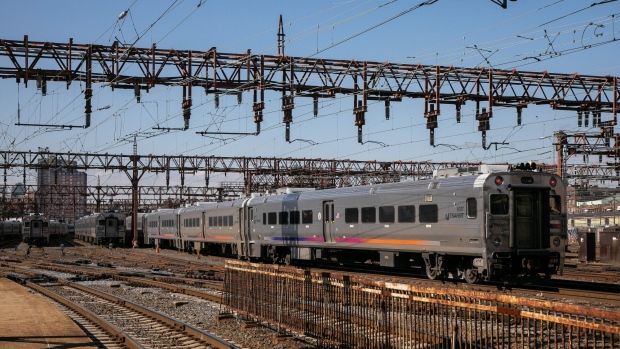Apr 10, 2024
New Jersey Transit Approves 15% Fare Hike to Plug Budget Gap
, Bloomberg News

(Bloomberg) -- New Jersey Transit riders can expect higher prices after the system’s board voted to raise fares to help cover a $107 million shortfall.
The 15% fare hike is slated to go into effect July 1 and would be followed by 3% annual increases thereafter to account for inflation. New Jersey residents commuting to New York will now have to weigh paying higher transit fees or a new congestion pricing toll on most drivers entering Manhattan’s central business district. That plan is poised to begin as soon as mid-June.
Proponents say the steeper prices are needed to close the budget deficit for the coming fiscal year, while still maintaining current service. The cash-strapped agency last raised fares in 2015.
“While a fare increase is always an option of last resort and we recognize the impact an increase of any size has on all our customers, I remain strongly committed to ensure that the overall service levels are not reduced,” Kevin Corbett, the system’s president and chief executive officer, said at the Wednesday board meeting.
Read more: NJ Transit Riders Face 15% Fare Increase to Close Budget Gap
Public-transit agencies across the US are struggling as pandemic-era aid sunsets and ridership remains stubbornly below pre-Covid levels, with many workers embracing a hybrid work environment. The fare increases are designed to help bridge the transit agency’s short-term cash-flow problems.
As part of the upcoming budget, New Jersey Governor Phil Murphy has proposed a tax hike on the state’s biggest businesses to support the operator in the long run. The move — which would make the state’s corporate levy the highest such rate in the US — would devote a dedicated stream of revenue to NJ Transit, a step advocates say is desperately needed.
The fare hike is controversial and drew sharp rebuke from attendees during the public comment period of Wednesday’s meeting. Hoboken Mayor Ravi Bhalla advocated against the increase, which he called “a backdoor tax on working families.” Hoboken, located directly across the Hudson River from New York City, is a major commuter hub.
Even board members who voted for the hike seemed to do so reluctantly.
“This vote pains me very, very much,” said Shanti Narra, a board member who voted in favor of the increase. She said while she is sympathetic to riders bearing the burden of the higher cost, the alternative is to cut service and jobs at the system. “As a member of this board, we have a fiduciary duty to this agency.”
The added cost for New Jersey Transit riders will depend on how far they’re traveling. For example, a one-way ticket from Princeton Junction, New Jersey, to Pennsylvania Station in Manhattan currently costs $16. Under the new hike, that would rise by about $2.40, making a round trip roughly $37.
While the fare proposal doesn’t require specific approval by Murphy, all actions taken by the NJ Transit board are subject to a potential gubernatorial veto of the meeting minutes. NJ Transit officials acknowledged earlier this year that the increased prices could curb ridership, estimating a potential loss of 1.4% the next fiscal year.
(Updates with context throughout.)
©2024 Bloomberg L.P.






